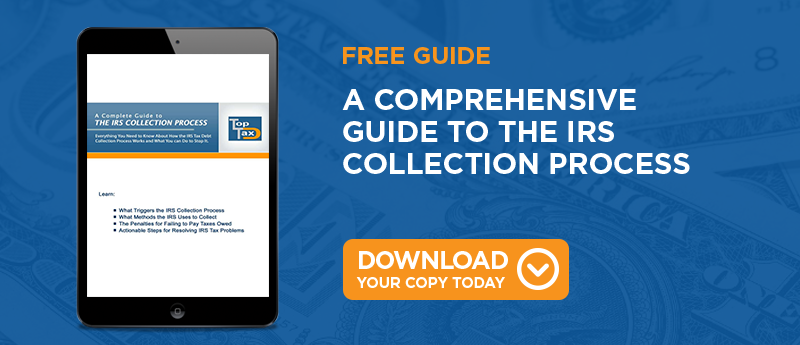
Like other creditors, the IRS has the right to collect on debts that are owed to it. People may not know, however, the precise method that the government uses to ensure that every tax dollar is paid to it in entirety. In reality, the collection process utilized by the IRS does not differ much than that used by other creditors like credit card companies and hospitals. Even so, delinquent taxpayers can benefit by knowing some of the more notable components of this collection process and how it could impact their debt to the IRS.
1) Priority
The first piece of information that delinquent taxpayers should realize is that the IRS makes it a priority to collect on every debt owed to it. While it may be generous with the time allowed for paying these amounts, this agency still pays close attention to those who make an effort to pay what they owe and those who shirk this obligation.
For those who ignore the letters from the IRS or simply refuse to pay what they owe, the IRS eventually will take steps to cure these accounts. People who believe that their debts will vanish or somehow be forgiven should realize that this organization makes every effort to prioritize its collection efforts against delinquent taxpayers.
2) Garnishment and Levies
Like other creditors, the IRS sometimes utilizes garnishments and levies to collect what is owed to it. It has the option of garnishing wages and seizing assets without a court order, making this risk a very real possibility for taxpayers who simply refuse to acknowledge their outstanding obligation.
When it proceeds with garnishing someone's paycheck or putting a lien on a bank account, the IRS often will not release this hold until the debt has been paid in full. For those who owe substantial amounts, this hold could remain in effect for years, making it difficult for them to pay their bills or live normally with such restricted finances. People who want to avoid this action should communicate with the IRS and seek another resolution to settle their tax debt.
3) Filing Compliancy
When people want to avoid being garnished or having their assets frozen, they may consider petitioning for an installment agreement or an offer in compromise. To take advantage of these options, however, they must be compliant with their tax filings.
If they have returns that must yet be filed or have not filed for the current year, for example, people who owe the government money may not be eligible to ask for an installment payment agreement or an offer in compromise. Even more, if they cannot yet take steps to become compliant, they may still face the risk of being garnished or having liens attached to their assets.
4) Length of Debt
While some forms of debt may be written off by creditors, an IRS debt can remain in effect for years. People who hope that their outstanding taxes will be forgiven or written off by the government are often disappointed to learn that this debt can follow them for years until it is addressed fully. Because of the priority that the IRS places on collecting debts, these individuals also can face years of collection attempts until they pay off their delinquencies.
5) Time Limitations
At some point, however, even the IRS runs out of time in collecting debts owed to the government. Indeed, it cannot collect on outstanding amounts that are 10 years past due. If people owe taxes from a decade or more ago, they may be in the clear, given the restrictions placed on this agency for collecting owed taxes. This fact can help people decide what action they want to take to resolve their longstanding debts or if they even have to legally address it at this point.
6) Right to Dispute
The IRS also must allow people the right to dispute the amount of taxes they owe to the government. If they can prove that they owe a lesser amount or simply have questions about how they can owe so much, people have the right to request a meeting with this agency. They do not have to accept the amount listed in communications from the IRS and can instead dispute the sum that they actually owe.
7) Right to Professional Tax Counsel
Taxpayers also have the right to retain counsel if they are unsure of how to represent and advocate for themselves through the debt collection process. Rather than risk their financial stability and assets, people can hire a tax adviser to negotiate on their behalf and speak for them with the IRS. People are typically informed of this right when they receive letters from the government regarding their tax debt.
The collection process utilized by the IRS may appear to be similar to that used by other creditors. Even so, people should understand the finer aspects of the IRS collection process and learn how it can impact their ability to repay their debt to the government.




